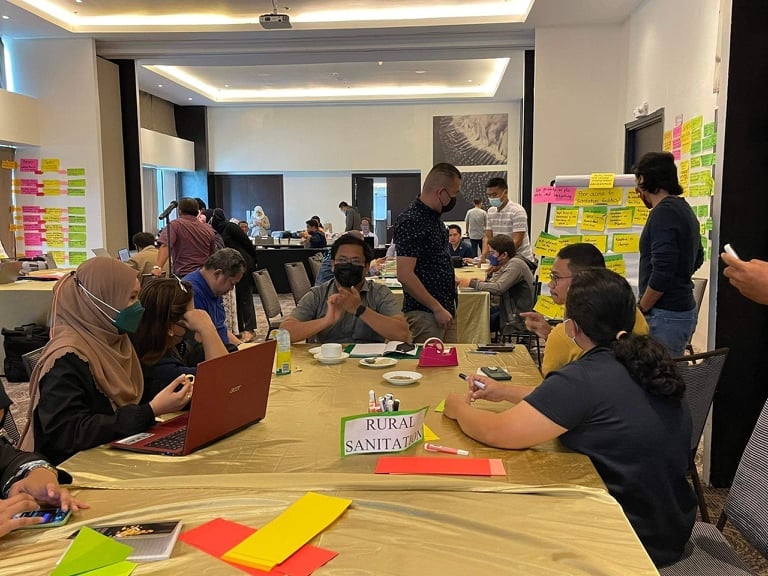
COTABATO CITY — The Bangsamoro Sub-Committee on Water, Sanitation and Hygiene (BSCW) under the umbrella of the Development Administration Committee (DACom) of the Bangsamoro Economic and Development Council (BEDC) convened on November 14-20 to conduct the Bottleneck Analysis Tool (BAT) training and strategic planning workshop held at Seda Abreeza Hotel, Davao City.
BAT training aimed to increase the efficiency of WaSH sector resources to reach more sustainable and equitable outcomes. This can be achieved through facilitating a dialogue between sector decision-makers which ultimately leads to practical proposals to remove barriers and improve sector performance.
Carlos Vasquez, Chief of Child Protection from the United Nations Children’s Fund (UNICEF), underscored that among all the regions in the country, BAT was firstly introduced in the Bangsamoro Autonomous Region in Muslim Mindanao (BARMM).
“We are all making history as this is the first bottleneck workshop in the Philippines and we are deciding the future of the next generations,” he stressed.
Vasquez also disclosed the data on the unimproved sanitation and open defecation in the BARMM, reaching the rate at 24% and 19%, respectively.
With the abovementioned data, Dr. Amirel Usman, Director General of the Ministry of Health (MOH), emphasized that all the houses in the BARMM should have toilet rooms to properly observe the zero open defecation in the region.
“Actually, nakausap ko ang minister ng human settlement. Sabi ko, since kayo ang nagpapagawa ng bahay, baka pwede sa pagpagawa niyo ng bahay, dapat titingnan kung wash compliant. Isa ‘yon sa checklist ng mga pabahay,” Usman said.
In his message, Nasiri Abas, Director of the Ministry of Environment, Natural Resources and Energy (MENRE), highlighted the need to maintain, promote, and ensure the hygiene, cleanliness, and purity of our ecosystem.
Engr. Mohajirin T. Ali, Director General of the Bangsamoro Planning and Development Authority (BPDA), urged to firstly implement this in every household before advocating this to the community as this is a serious matter that should be considered.
“Nandito ‘yong mga staff ko, I think 6 sila from 3 divisions. That’s how we are very supportive of this. We see to it na dapat yung cr namin sa opisina ay malinis kasi sabi ko sa kanila, that reflects our face in the office. Kung gaano kalinis yan, ganun din ang tingin ng tao sa amin,” he explained.
Furthermore, the strategic planning workshop aimed to facilitate the formulation of the strategic plan that will allow the BSCW to carry out its purpose aligned with the BARMM policies and development plan to deliver necessary programs and services that are beneficial to the social welfare of the Bangsamoro people.
“The moment that we will update the 1st Bangsamoro Development Plan, we will basically revisit all the programs especially like this to give emphasis in the development plan,” Ali added while announcing the updating of the 1st BDP to be conducted by the BPDA on the early part of 2022.
Khalid Dumagay, Director General of the Ministry of Interior and Local Government (MILG) acknowledged the presence of the aforementioned BARMM officials, citing it as a clear manifestation that the Bangsamoro Government supports the WaSH sector in the region.
“Kapag napakita natin at ma-convince natin siya (Engr. Ali) na itong result framework ay tugma doon sa issue, tugma doon sa concern ng WaSH sector, tingin ko makukuha natin ang suporta nila,” he said.
Dumagay further explained that through this workshop, said sub-committee would come up with a result framework, saying “Through our result framework, makikita natin at majujustify natin sa ating mga leaders.”
Meanwhile, the BPDA employees who participated in the 6-day training-workshop were Palawan T. Mamaon, Camelia N. De Vera-Dacanay, Lilania M. Mantoyan, Hannan Guiamilla M. Ibrahim, Princess Fahanna Azzizah G. Abas, and Mohammad Salman H.Nor. (BPDA-BARMM)
